By: Rebecca Peterson
Between construction and the start of fall semester, meeting spaces for internal library work have become a bit scarce in the Pattee Library and Paterno Library building. To help alleviate
the situation, we’d like to share this information about available meeting spaces.
The following meeting spaces can be scheduled through Outlook for internal library meetings:
Paterno 001F I-Tech Conference Room
Paterno 001E I-Tech Meeting Room
Paterno 510A Dean’s Conference Room
Paterno 510 M Small Conference Room
The following seminar room can be scheduled for meetings through Outlook, when not in use for instruction:
Pattee W325 Music Seminar Room
The Music Seminar Room is prioritized for instruction, so your group may be asked to move if your meeting interferes with a class.
Just a reminder, all instruction rooms are prioritized for instruction, so if you use 25Live to schedule a meeting in an instruction room, your group may be asked to move if your meeting
interferes with a class.
If you have any questions about scheduling, feel free to contact Rebecca Peterson at 865-9257 or rmr28@psu.edu.












